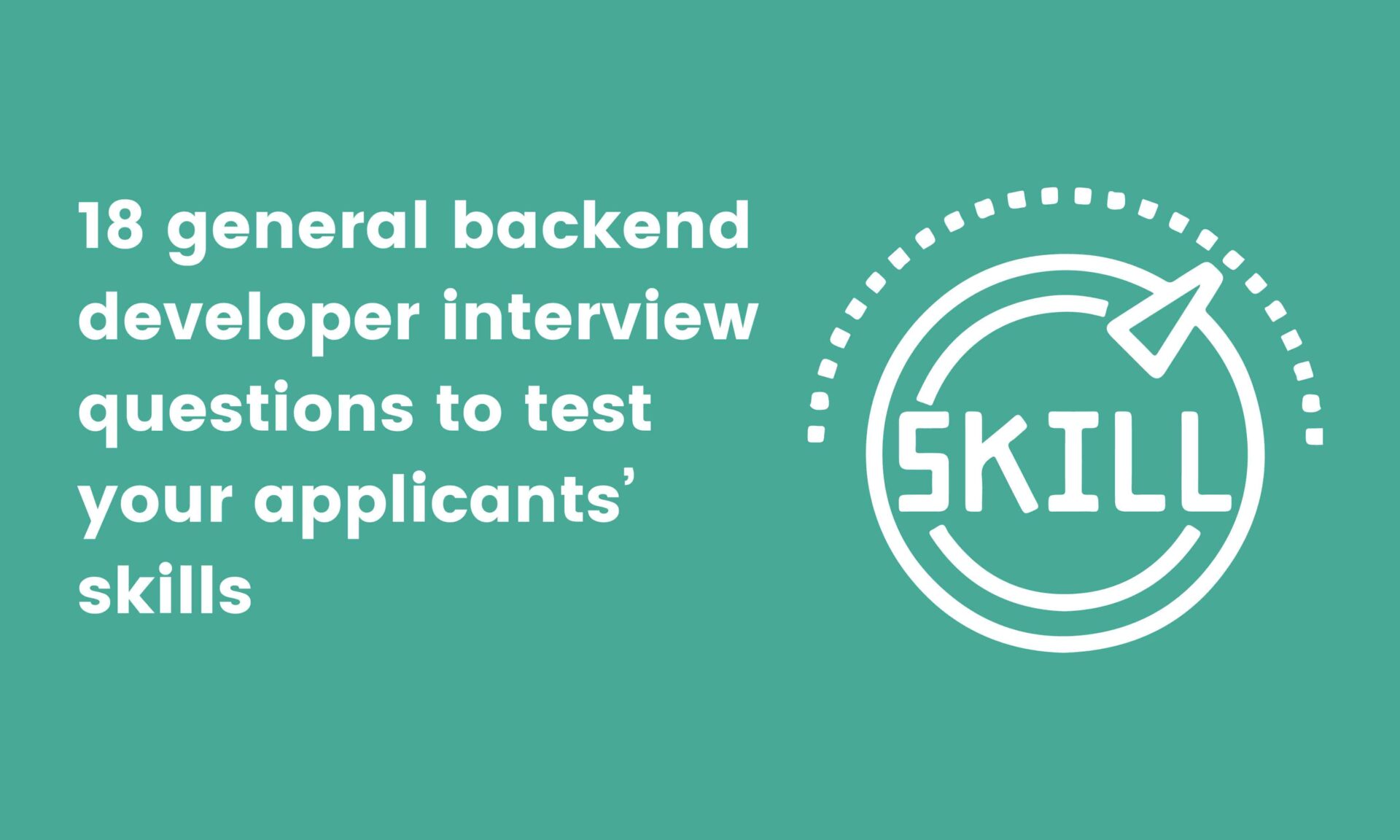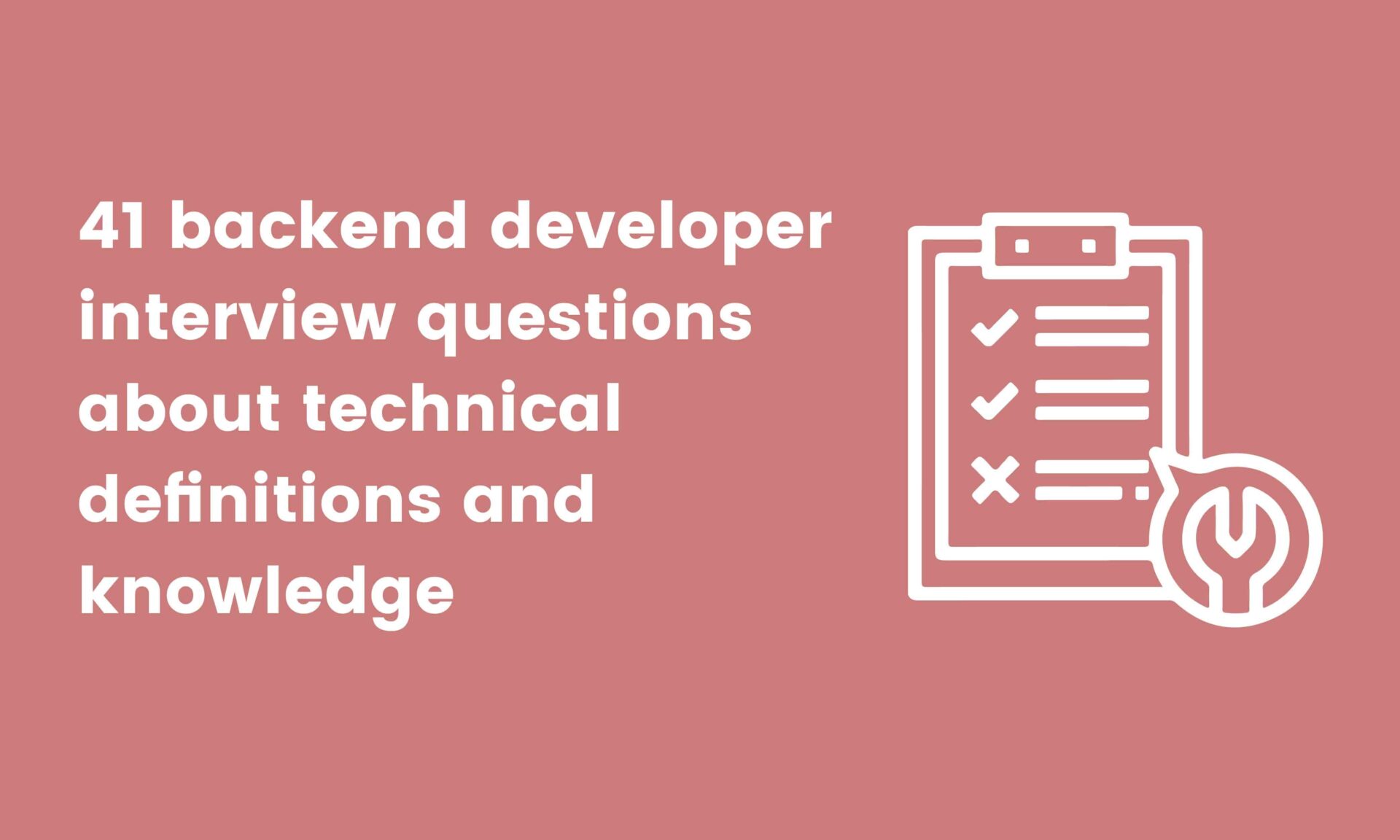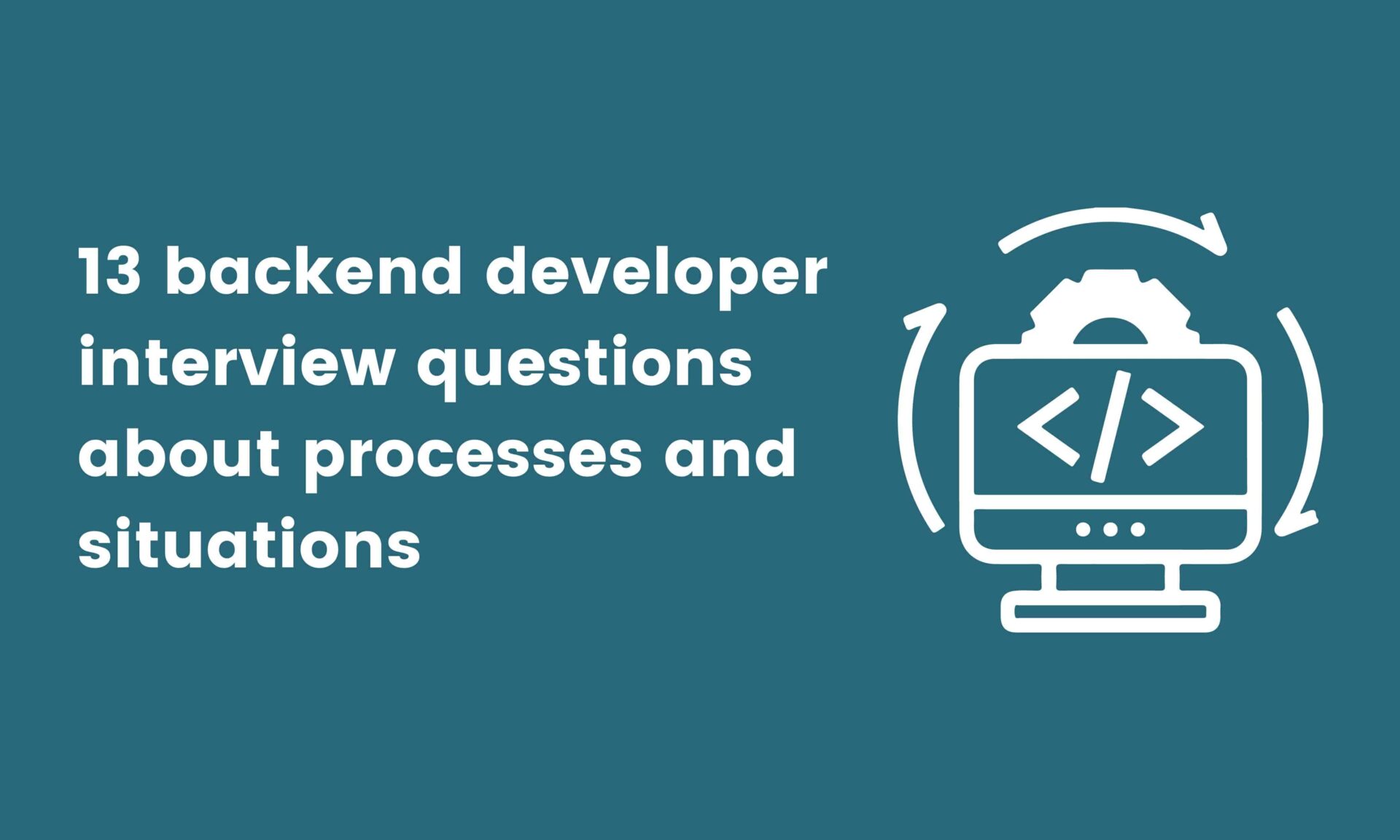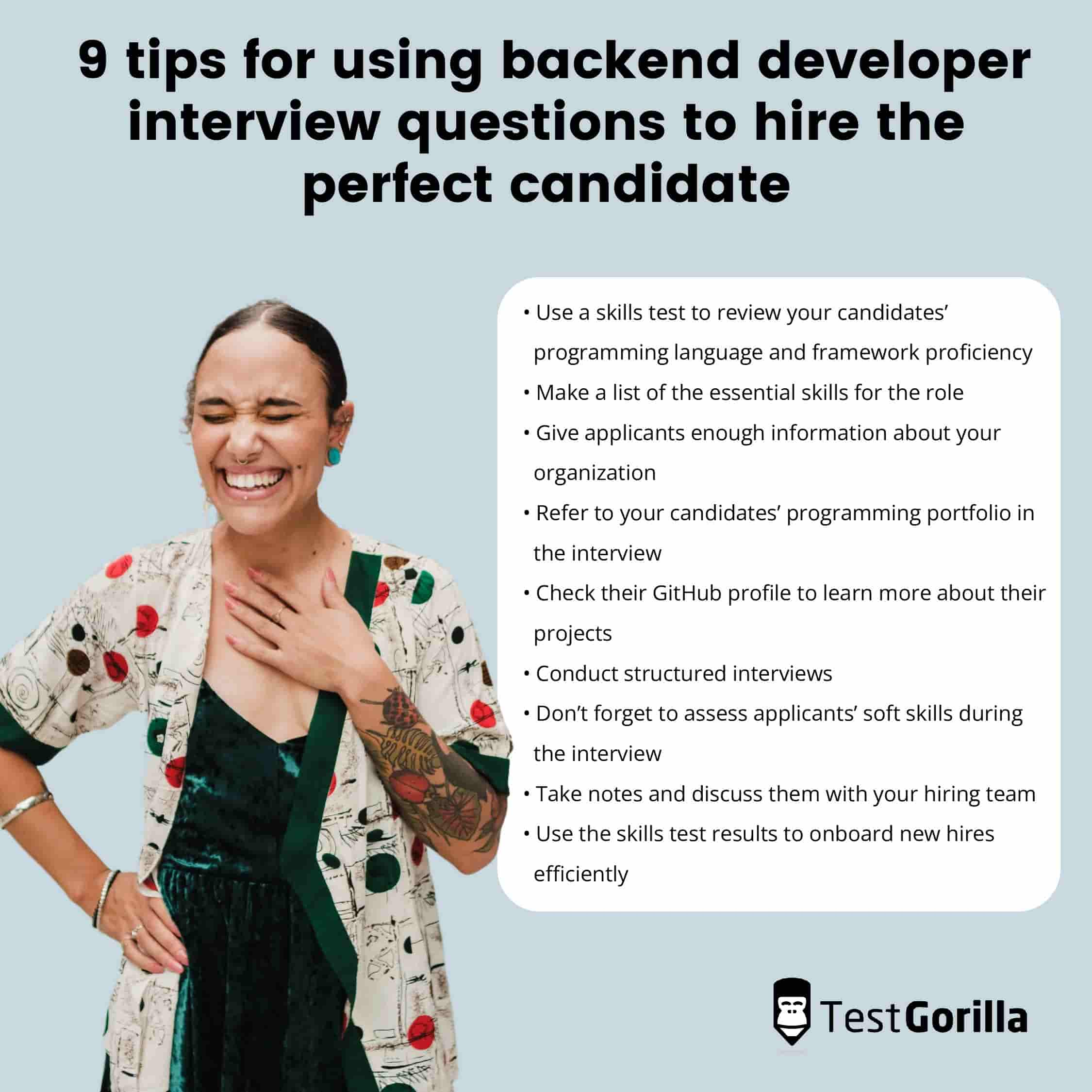72 backend developer interview questions to assess candidates
The technical skills you must assess are manifold if you’re searching for a backend developer for your team. From database knowledge to scripting to website architecture, applicants must be well-versed in the essential skills that facilitate complex backend development tasks.
But do you know how to review your applicants’ backend skills thoroughly? Using skills tests such as our Express.js skills test can help identify the best applicants.
Additionally, you’ll need a comprehensive list of backend developer interview questions for the interview stage. If you don’t know where to start, this article is for you.
This list of interview questions is a good starting point for conducting interviews with candidates for a backend development role. You’ll also find sample answers to some of the most important questions, which will help you review applicants’ responses.
Let’s dive in.
Table of contents
- 18 general backend developer interview questions to test your applicants’ skills
- 5 general backend developer interview questions and answers to review responses
- 41 backend developer interview questions about technical definitions and knowledge
- 5 backend developer interview questions and answers about technical definitions
- 13 backend developer interview questions about processes and situations
- 5 backend developer interview questions and answers related to processes and situations
- 9 tips for using backend developer interview questions to hire the perfect candidate
- When should you use skills tests during the hiring process?
- Hire talented professionals with the best backend developer interview questions
18 general backend developer interview questions to test your applicants’ skills
Ask your applicants some of these 18 general backend developer interview questions to test their general knowledge and skills.
Which technical skills do backend developers need to have?
Which soft skills do backend developers need to be successful?
Name the main backend development responsibilities you had in your previous role.
Which backend developer skills do you lack? How are you trying to improve?
Which is your favorite programming language?
Which programming language is your least favorite?
How are web services beneficial?
What are the advantages of using Go?
Explain the advantages of microservice architecture.
Describe your experience working as a part of a team.
What do you hope to have achieved in three years?
How would your current co-workers describe you?
Which method do you use to remain up-to-date with the latest trends in backend development?
Describe your greatest coding strength.
Explain how your coding career began.
How do you receive and make use of negative feedback as a backend developer?
How do you share negative feedback with your co-workers?
Describe your object-oriented programming experience.
5 general backend developer interview questions and answers to review responses
Here are the answers to five of the general backend developer interview questions. They’ll be handy for reviewing your applicants’ responses.
1. Name the main backend development responsibilities you had in your previous role.
Asking applicants this question will help you learn how familiar and experienced your candidates are with backend development, and whether the responsibilities of their previous role are similar to the ones of your open position.
Applicants may mention a few key responsibilities, such as server improvements, database creation, server-side application creation, and more.
2. How do you share negative feedback with your co-workers?
While applicants may think a performance review or weekly team discussions are an ideal time to give feedback, they must understand that often feedback is best delivered as soon as they notice an error.
Can your applicants explain that structure is also essential when giving negative feedback? Candidates should know that using the following structure can be beneficial:
State the problem
Explain the significance of the problem
Explain why the problem is essential to them
Explain what the developer or the team can gain by working on the problem
Outline potential solutions and approaches
Provide support and offer help to the co-worker
3. Describe your experience working as part of a team.
Working as part of a team is fundamental for backend developers. Applicants should be able to give you a few examples of times when they have worked as part of a team and be able to talk about them in detail when responding to this interview question.
They may mention that they have collaborated with other developers to achieve a shared goal and explain what communication tools they have used to share ideas.
3. Which backend developer skills do you lack? How are you trying to improve?
Your applicants may not have every backend developer skill you require. The important thing is that they are trying to improve the skills they lack.
Do they have any side projects to help them practice and improve their skills? For instance, if they’re lacking the knowledge needed to perform SQLite database operations, are they working on getting more experience with SQLite?
5. Which technical skills do backend developers need to have?
Applicants should know that various technical skills are critical for backend developers. In addition to knowledge of PHP and Git, for example, they may also mention JavaScript and HTML.
Your candidates may also mention that backend framework knowledge is essential for backend developers. Some frameworks they may cite include Node.js, Express.js, or Django.
The best insights on HR and recruitment, delivered to your inbox.
Biweekly updates. No spam. Unsubscribe any time.
41 backend developer interview questions about technical definitions and knowledge
Ask your applicants some of these 41 backend developer interview questions about technical definitions to determine whether they have the right in-depth knowledge to join your team.
Explain what NoSQL databases are.
Define containerization.
Name four different examples of NoSQL databases.
Explain and define the CAP theorem.
Explain what SQL injection is.
Explain what continuous integration is.
Explain what REST means in backend development.
Explain the difference between software design and architecture.
Explain what JavaScript is. When do developers and engineers use it?
Explain what acceptance tests are.
Explain what functional tests are.
How are acceptance tests different from functional tests?
Explain what high availability refers to.
Explain and define the ACID acronym.
Explain and define “session affinity.”
Name some disadvantages of REST web services.
Explain what clustered indexes are.
Explain what non-clustered indexes are.
Explain how non-clustered and clustered indexes are different.
Explain what continuous integration is.
Explain what continuous delivery is.
Explain what continuous deployment is.
Explain what monolithic architecture is.
Explain what service-oriented architecture is.
Explain what microservice architecture is.
Explain what the API Gateway pattern is.
Explain what SSL is.
Explain how SSL works.
Explain how b-trees indexes work.
Explain distributed transactions.
Explain what a God class is.
Explain what spike testing refers to.
Can you explain what the base property of systems is?
Explain what faking refers to in backend development.
Explain what mocking refers to in backend development.
Explain what stubbing refers to in backend development.
Explain why application layering is crucial.
Explain what “stack” is in backend development.
Explain what “heap” is in backend development.
Explain what stack overflow refers to.
Explain what cohesion refers to.
5 backend developer interview questions and answers about technical definitions
Here are the answers to five of the backend developer interview questions about technical definitions. Refer to them when assessing your applicants’ responses.
1. Explain the difference between software design and architecture.
Can your applicants explain that while software architecture displays the system’s structure and how the components interact with each other, software design focuses on the implementation of the system?
Are they also aware that the architecture is comparable to a system’s outline or blueprint, whereas the design corresponds to the action of making a plan for a system?
2. Explain what continuous integration is.
Knowledgeable backend developers should know that continuous integration refers to a practice in which developers use a shared repository into which they integrate code.
They may also explain that automated builds perform verifications at every check-in. These verifications make it simpler for teams to identify problems early on in the process.
3. Explain what continuous delivery is.
Skilled backend developers should know that continuous delivery refers to a process in which developers release changes to clients sustainably, efficiently, and quickly. In addition to automated testing, continuous delivery ensures that the release process is also automated and that developers can deploy applications simply by clicking a button at any stage.
4. Explain what continuous deployment is.
Applicants should know that continuous deployment refers to a process in which all changes that go through the production pipeline stages are released to clients.
With continuous deployment, human intervention is not required. Applicants should know that only when a test fails can new changes be prevented from being deployed.
5. Explain how non-clustered and clustered indexes are different.
Can your interviewees explain that clustered indexes have physically stored rows on disks that follow the same order as the index?
Are they aware that there is only one clustered index, and do they know that non-clustered indexes have many indices that lead to longer timeframes to write new records?
Applicants may mention non-clustered indexes that feature second lists with pointers for the physical rows. Clustered indexes are faster to read but can take a long time if developers need to rearrange data.
13 backend developer interview questions about processes and situations
Ask interviewees some of these 13 backend developer interview questions about processes and situations to learn whether their skills and experience match your requirements.
Describe your debugging process.
Which method would you use to locate expensive queries on a server?
Which method would you use to prevent SQL injection risks?
Name the steps you would take to complete performance testing processes.
Which best practices would you follow as part of the performance testing process?
In which situation would you use Redis?
In which situation would you use MongoDB?
Which method would you use to implement SSO authentication for microservices?
Which method would you use to handle large amounts of data with limited memory?
Which method would you use to handle the API versioning of web services?
In which situation would you implement asynchronous communication with different systems?
Describe your best project. What made it successful? Were there any challenges?
Have you ever encountered a major roadblock when working on a project? How did you handle it?
5 backend developer interview questions and answers related to processes and situations
Here are the answers to five of the backend developer interview questions related to processes and situations. Use them when reviewing the responses of your candidates for a backend developer role.
1. Which method would you use to handle large amounts of data with limited memory?
Knowledgeable backend developers should know that the fastest and most efficient option for handling large amounts of data with limited memory is to divide the data into smaller parts. They may then explain that a merge or external sort can make it easier to break the data into smaller parts.
2. Describe your best project. What made it successful? Were there any challenges?
Applicants may list various projects and list different factors that made them successful. Since there may have been many challenges that your candidates encountered, listen for the steps they have taken to overcome them.
Some of the challenges they may have encountered include learning a new framework or getting to grips with a new backend language. For instance, they may mention that they were unfamiliar with PHP or C# and found ways to quickly gain the necessary skills and knowledge to complete the project.
3. Have you ever encountered a major roadblock when working on a project? How did you handle it?
There are various roadblocks your applicants may have encountered when working on a project. From broken code to bugs, there are several blockers that can interfere with the backend development progress.
It’s essential to ensure your applicants have strong problem-solving skills (which you can also assess with our Problem-solving test) and aim for efficiency when tackling roadblocks.
4. Which method would you use to prevent SQL injection risks?
A few steps your applicants may mention in response to this interview question are to:
Use prepared statements and parameterized queries and make sure the interpreter can tell the difference between data and code
Use stored procedures and calling them needed to avoid dynamic generation in SQL
Use white list input validation and avoid blacklist methods since these are not as secure
5. Name the steps you would take to complete performance testing processes.
Candidates should be aware of the steps required to complete performance testing processes. Some of the essential steps are to:
Identify the environment for testing
Identify the metrics for performance
Plan toward performance tests
Configure the environment for testing
Implement the plan and design
Execute the tests
Analyze the test, writing reports, and retesting
9 tips for using backend developer interview questions to hire the perfect candidate
You now have 72 backend developer interview questions that enable you to assess your applicants’ skills, experience, and knowledge.
To use them without any difficulties and streamline your recruitment process, consider our nine tips below:
1. Use a skills test to review your candidates’ programming language and framework proficiency
With skills tests such as TestGorilla’s, you can review your candidates’ proficiency in back-end languages and frameworks quickly and efficiently.
For example, you can test applicants’ knowledge of Express.js, Node.js, or REST API, among other essential backend development skills.
With skills tests, you can find the best backend developers among your applicants with minimal effort and time investment. Simply use our skills tests right after you source candidates to better understand their backend developer skills and identify those who meet your criteria for the role.
By helping you reduce bias and the time to hire, our tests mean you can streamline your hiring process to find the best applicants without any hassle. Then, you simply need to invite them to an interview for a deeper evaluation of their skills and find the perfect match.
2. Make a list of the essential skills for the role
Before you proceed with the interview phase and use the backend developer interview questions from this article, make sure you have a list of the essential skills for the open role, as well as specific soft skills your organization requires.
List them by order of importance, from essential to less critical, and use the list when evaluating applicants. This will help you and everyone on your hiring team stay focused on your priorities and not get distracted by applicants who have strong skills in other areas but aren’t the right fit for this role.
3. Give applicants enough information about your organization
Applicants keen on joining your team as a backend engineer or developer will definitely want to know more about your organization. The interview is a great time to share details about your team and the business.
Structure the interview in a way that you can dedicate some time to talking about your company with applicants.
For example, you may give your applicants information at the beginning of the interview as an introduction. You may also set aside some time towards the end of the interview for your applicants to ask you questions. Be prepared to share details about current and future projects your new hire would work on.
4. Refer to your candidates’ programming portfolio in the interview
Your candidates’ programming portfolio can give you plenty of information about their achievements and level of expertise. You may want to ask for more information about their portfolio during the interview to determine whether the skills they have used for previous projects match your backend developer role.
For example, your applicants may have used Express.js to complete a backend programming project in their portfolio. Consider whether skills such as these are essential for your role and note which applicants have used them in recent projects.
5. Check their GitHub profile to learn more about their projects
Just as you can ask candidates about their programming portfolio in the interview, you can also ask them for their GitHub profile to learn more about their past projects and discuss them during the interview.
Take note of any outstanding achievements or projects and check whether they have completed similar projects to the ones required for your open role.
For example, have they used a particular framework that your business also uses? Have they used a programming language that’s frequently used by your team of backend engineers? Ask targeted questions (such as the ones from this article) to learn more about your applicants.
6. Conduct structured interviews
Now that you’ve got a list of backend developer interview questions prepared, it’s time to decide how to use them.
At TestGorilla, we know that structured interviews are ideal for comparing candidate responses and eliminating interviewer bias.
Conducting structured interviews means asking all applicants the same questions in the same order. You can stray from the script if you need to ask follow-up questions, but make sure you don’t skip important questions.
This method enables you to reduce small talk to a minimum (and hence, limit biases) and easily compare applicants’ responses to see who truly fits your requirements.
7. Don’t forget to assess applicants’ soft skills during the interview
Soft skills are vital for backend developers, so make sure you remember to review your applicants’ skills during the interview. To achieve this, you may ask situational backend developer interview questions that will get candidates talking about their soft skills.
For example, you may ask, “Which techniques do you use when working as a team?” or “How have you resolved conflicts with co-workers in the past?”.
Look for responses that demonstrate top communication, problem-solving, and critical-thinking skills.
8. Take notes and discuss them with your hiring team
Remembering your applicants’ responses to all interview questions is nearly impossible. To handle this challenge, take notes during interviews. To make a hiring decision confidently, compare your notes with the rest of your hiring team.
Remember to also check applicants’ test scores to get the full picture and make sure you’re choosing the best candidate.
9. Use the skills test results to onboard new hires efficiently
You can also use skills test results to onboard your new hire quickly and efficiently. Consider which skills your new hire needs to focus on and make sure training sessions include these topics.
When should you use skills tests during the hiring process?
The best time to ask applicants to complete a skills test is right after sourcing.
By using skills tests at this stage, you’ll save valuable time and ensure the applicants you interview truly have the skills you need.
You’ll also limit hiring biases: Skills tests are automatically graded and give you an objective reflection of applicants’ abilities. This allows you to easily filter unskilled applicants and concentrate only on the best talent.
Hire talented professionals with the best backend developer interview questions
Hiring an expert backend developer may seem difficult at first. There are various technical intricacies you need to consider, and you may be unsure how to review your applicants’ skills.
For the best results, we advise you to use a skills assessment that features the right technical skills tests, such as our Express.JS test, to identify the most capable backend engineers in your talent pool. You can also use cognitive-ability tests to evaluate your candidates’ soft skills and make sure they would be a good fit for the role.
Then, invite the top respondents to your backend developer job description to an interview to further assess their skills with the help of our interview questions above. This way, you’ll be able to shorten and simplify your hiring process and make the best decision with confidence and ease.
Find the best backend developers for your organization with the help of TestGorilla’s skills assessments and our interview questions. Eliminate stress and bias from your recruitment process, starting today.
Get started for free today and start making better hiring decisions, faster and bias-free.
You've scrolled this far
Why not try TestGorilla for free, and see what happens when you put skills first.


















